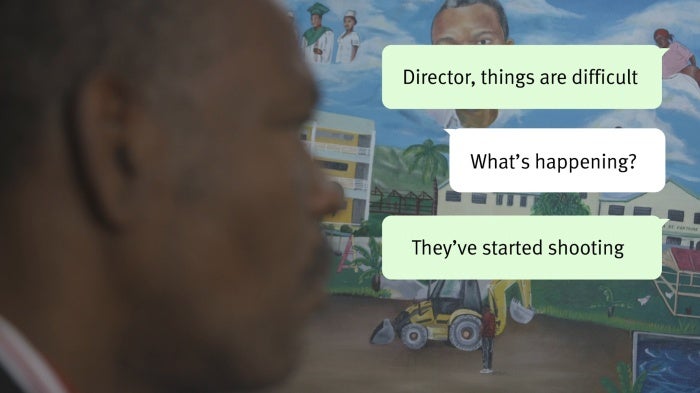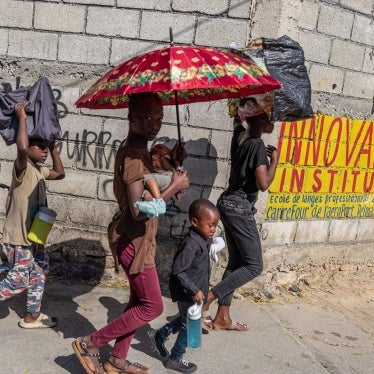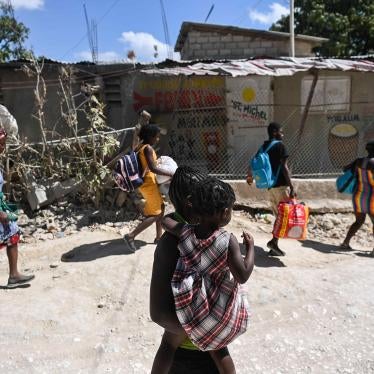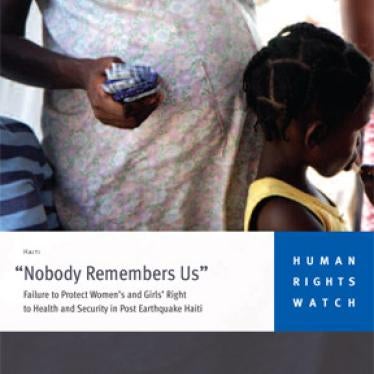(New York) – Haitians urgently need a rights-based international response amid a surge in killings and kidnappings, rampant sexual violence, and a severe food crisis, Tirana Hassan, executive director at Human Rights Watch, said today in remarks delivered at a United Nations Security Council meeting on Haiti.
Council members met to assess recent developments in Haiti, where criminal groups prevent the delivery of humanitarian assistance to people in dire need of food, medicine, and other aid. For years Haiti has faced a severe political, humanitarian, and security crisis, which has only worsened since the assassination of President Jovenel Moïse in 2021.
“Haitians are experiencing terrifying levels of violence, while also struggling to feed their families and get access to other basic necessities,” Hassan said. “Each day that passes without a meaningful increase in international support that addresses all aspects of the crisis puts more lives at risk.”
In October 2023, the Security Council authorized the deployment to Haiti of a Multinational Security Support mission, to be led by Kenya. Deployment of the mission and other critical components of the response have stalled, as the situation for many Haitians has worsened. The deployment is pending a ruling from Kenya’s High Court, due on January 26, 2024, on the legality of the Kenyan police service's participation.
As violent criminal groups intensified their activities across the metropolitan area of the capital, Port-au-Prince, and in the rural Artibonite department, more than 4,700 people were killed in 2023 – more than double the previous year – and almost 2,500 others were kidnapped, according to the UN. Over 300,000 people are internally displaced, living with host families, or in makeshift or open-air shelters, with little to no humanitarian assistance. UN agencies estimate that nearly half of the population will need humanitarian assistance and protection in 2024, with 4.35 million people acutely food insecure.
Tensions have escalated across the country since the return to Haiti of Guy Philippe, a former police commander-turned-coup instigator, in late November 2023, after he served over six years in a United States prison on money laundering and drug charges. He reportedly has the support of members of the heavily armed Protected Areas Surveillance Brigade, a government security force, and has publicly called for a revolution, triggering protests and forced shutdowns in early and mid-January. This has contributed to the increase in food insecurity and fuel shortages in the southern region of the country.
Some of the worst violence has been in Cité Soleil, on the outskirts of Port-au-Prince, where clashes in mid-November, following the death of a criminal group leader, killed 87 people, injured 46 others, and displaced over 1,000 people, according to the UN. On November 15, Fontaine Hospital, one of only two hospitals still functioning in Cité Soleil, was caught in crossfire, putting over 70 patients, including newborns and older children, at risk, and threatening access to health care for thousands of residents. A Human Rights Watch video feature published today, tells the harrowing story of how the hospital staff evacuated women, babies in a neonatal unit, and other patients and staff amid the ongoing fighting.
Across much of Haiti, women and girls as young as 12 face high levels of sexual violence. Human Rights Watch has documented how, in Cité Soleil, criminal groups, including the G9 alliance, rape women and girls to instill fear, as part of their efforts to gain control of areas controlled by rival groups, demonstrate their control, or punish those living in areas controlled by rival groups.
The survivors have called for concrete actions that will enable them to live a life free from violence and fear, where they can meet their basic needs, work, send their children to school, and choose their government and elected leaders.
A nurse who lives in Cité Soleil and witnessed the mid-November clashes told Human Rights Watch in January that an international response to help Haiti overcome the crisis was urgently needed. “We really need it, as long as they are serious and provide real support, including in places like Cité Soleil,” she said. “We are suffocating. Haitians are suffocating.”
Haitians are painfully aware of the failures and abuses associated with past international interventions, including allegations of widespread sexual abuse by peacekeepers, and a cholera epidemic traced to peacekeepers that killed 10,000 people and to which a current epidemic can in part be traced. Despite this, many people told Human Rights Watch they see no alternative to international support.
As Kenyan and other forces prepare for potential deployment in the coming weeks, the UN Security Council should press troop-contributing countries and donors to implement a human rights due diligence policy that is at least as rigorous as the UN applies to its peacekeeping missions. This includes vetting members of the mission before they are deployed and mitigating the risk that the mission will enable abusive Haitian National Police units.
The Security Council should also reiterate zero tolerance for any misconduct or abusive behavior, including sexual exploitation, by members of the international mission and support independent oversight, investigation, and accountability for any abuses with the involvement of Haitian civil society groups and affected communities.
The Security Council resolution authorizing the formation of the mission recognized the broader efforts needed to sustainably address the political, institutional, and socio-economic instability in Haiti.
Breaking Haiti’s political deadlock is critical, but despite the efforts of leaders from the Caribbean Community, it persists. Agreements signed by Prime Minister Ariel Henry in 2021 and 2022 with Haitian opposition groups, civil society, and business actors remain unfulfilled. There is still no transitional government to organize free and fair elections, meaningfully address the continuing challenges of justice and accountability of senior political, economic, and security actors that allow violent criminal groups to operate or restore access to critical services and basic necessities for many Haitians, the lack of which fuels recruitment by criminal groups.
The UN should support strong measures to ensure accountability by leaders of criminal groups and their backers, and to curb the flow of weapons to these groups. Rebuilding shattered communities while addressing Haitians’ urgent humanitarian needs will require many UN entities to coordinate their work to deliver humanitarian and development assistance.
Haiti’s neighbors should stop forcibly returning people fleeing the insecurity to Haiti, as long as conditions present a real risk of serious harm. According to the International Organization for Migration, at least 216,600 people were returned to Haiti in 2023, the vast majority from the Dominican Republic (81 percent) and the United States (11 percent). Returns of Haitians including children, to the country, where they are exposed to serious or irreparable harm, amount to refoulement, in violation of international human rights laws.
“The UN has made many mistakes in Haiti,” Hassan said. “This is an opportunity to get it right, to support Haitian efforts toward democratic governance and respect for human rights, and to end the deadly cycles of violence and abuse.”







